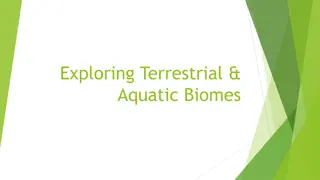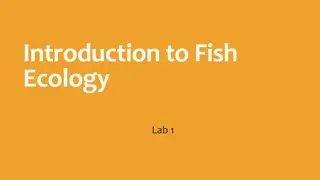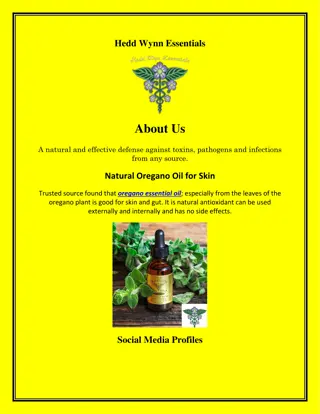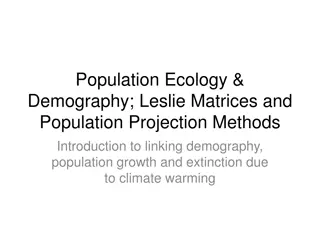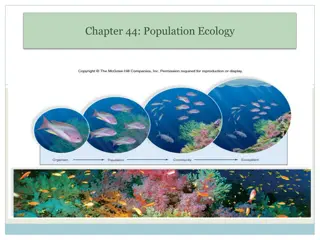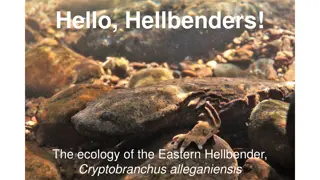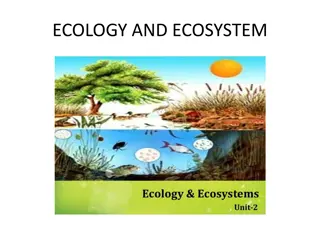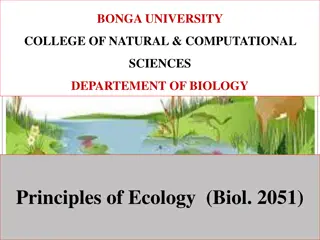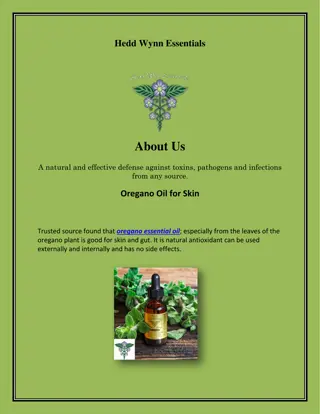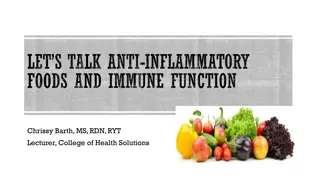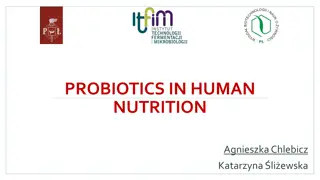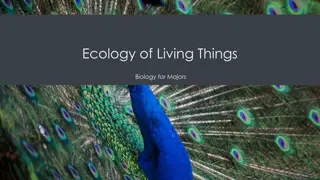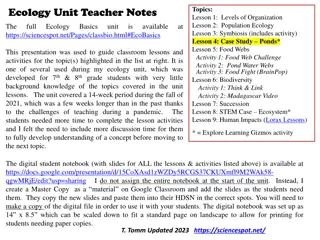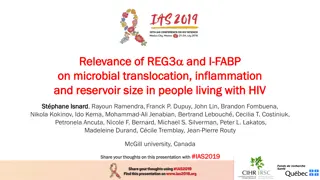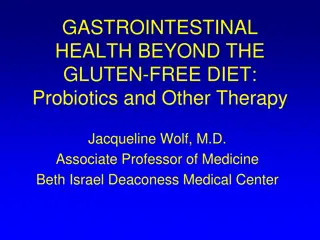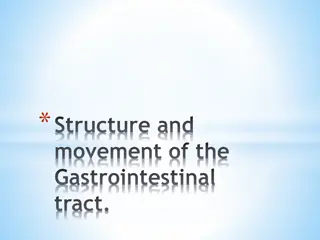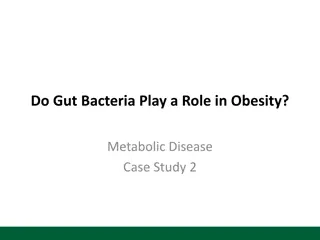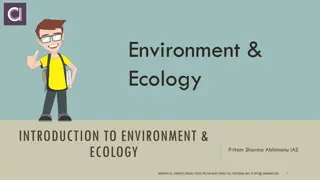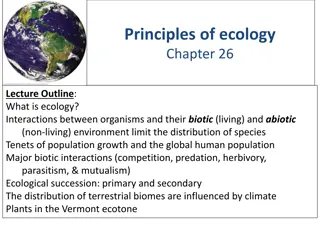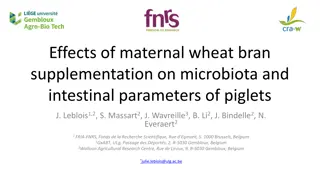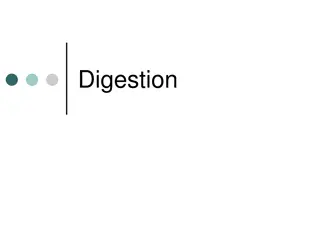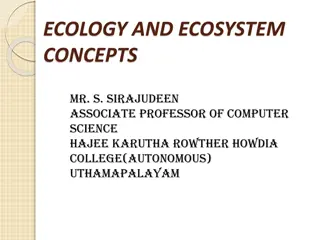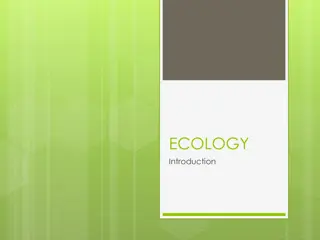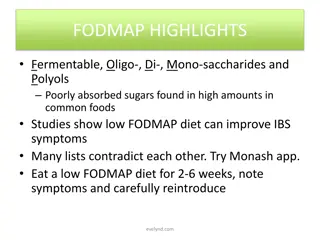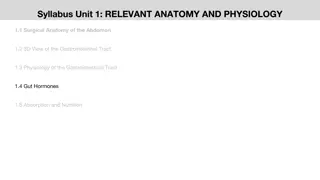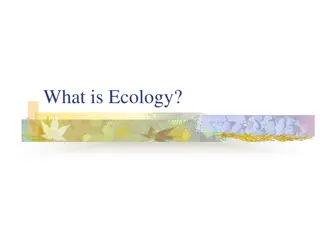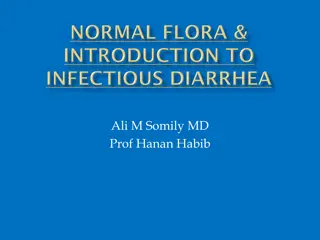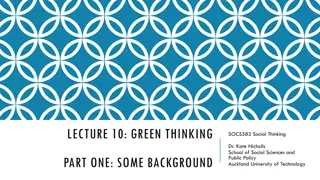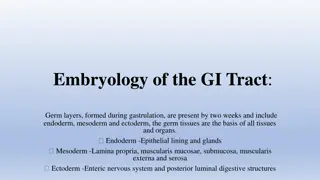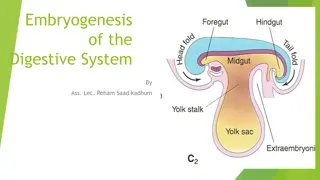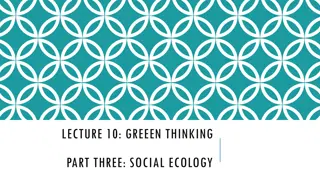Enhancing Cognitive Performance through Gut Microbiome Targeting
Explore cognitive performance, gut microbiome, and physiological responses in high-stress scenarios. Develop targeted inventions like pre- and probiotics for improved cognitive performance.
0 views • 5 slides
Understanding Ecology: Interactions Between Organisms and their Environment
Ecology is the scientific study of how living organisms interact with each other and their environment. It delves into the relationships between biotic and abiotic factors, encompassing topics such as the distribution and abundance of organisms, structural adaptations, behavior under natural conditi
2 views • 42 slides
Understanding Ecosystems: Ecological Interactions and Dependencies
Ecology is the study of how organisms interact with their environment, influencing their distribution and abundance. This exploration covers terrestrial and aquatic biomes, energy flow, environmental impacts, adaptations, and global ecosystems, emphasizing the interconnectedness of all living organi
2 views • 58 slides
Understanding Fish Ecology: Interactions, Diversity, and Environmental Factors
Fish ecology involves studying the distribution, interactions, and abundance of fish species in different ecosystems. This lab delves into the divisions of ecology, fish species diversity in marine and freshwater ecosystems, and the environmental factors affecting fish diversity and abundance. Disco
1 views • 7 slides
Oil of Oregano for Gut Health, wildoiloforegano.com
Trusted source found that oregano essential oil; especially from the leaves of the oregano plant is good for skin and gut. It is natural antioxidant can be used externally and internally and has no side effects. \/\/wildoiloforegano.com\/
2 views • 2 slides
Oregano Oil for Gut Health, wildoiloforegano.com
Trusted source found that oregano essential oil; especially from the leaves of the oregano plant is good for skin and gut. \/\/tinyurl.com\/bdz6rp89
2 views • 2 slides
Practical Tips for Resetting and Enhancing Gut Health
Uncover how stress, sleep, and exercise influence gut health. Gain practical strategies to manage stress, improve sleep quality, and incorporate regular physical activity.\n\n
2 views • 2 slides
Nourish Your Gut: Ayurvedic Diet Tips for Improved Digestion
Transform your digestive health with Ayurvedic diet tips designed to nourish and support your gut. Discover the importance of warm, freshly cooked foods and mindful eating practices in Ayurveda. Explore how incorporating pomegranate juice and warm wa
3 views • 6 slides
Understanding Population Ecology and Demography Through Leslie Matrices
Explore the critical aspects of population ecology and demography, focusing on factors influencing abundance, population growth, regulation, and the impacts of climate change. Learn about population projections, growth models, age-structured populations, and data requirements for estimating populati
4 views • 35 slides
Understanding Population Ecology and Growth Patterns
Explore the intricacies of population ecology, demography, distribution patterns, and growth rates in natural populations. Learn about limiting factors, resources, biotic potential, and the concept of carrying capacity. Gain insights into population dynamics and the interplay between organisms and t
1 views • 19 slides
Understanding the Ecology of Eastern Hellbenders
This comprehensive guide explores the ecology of Eastern Hellbenders (Cryptobranchus alleganiensis), discussing the abiotic and biotic factors influencing these fascinating salamanders. Covering topics such as populations, communities, and the essential role of producers, it sheds light on the chall
2 views • 16 slides
Understanding Ecology and Ecosystem: A Comprehensive Overview
Ecology, derived from the Greek word "oikologie," explores the interactions between organisms and their environment. The study encompasses various branches like human ecology, population ecology, and habitat ecology, focusing on the relationships within ecosystems. An ecosystem, defined by A.G. Tans
1 views • 68 slides
Understanding Media Ecology: Impact of Communication Technology
Media ecology is a theoretical concept analyzing the influence of media and communication technology on human culture. Neil Postman, a prominent figure in the field, delves into how communication media affect human perception, understanding, and values. This study views media as environments shaping
5 views • 23 slides
Principles of Ecology: Understanding Organism-Environment Interactions
Ecology is the scientific study of how living organisms interact with each other and their environment. It involves understanding organisms at their native habitats, from individuals to ecosystems. The discipline encompasses various branches and focuses on the relationships shaping the distribution
1 views • 14 slides
Oil of Oregano for Gut Health, wildoiloforegano.com
Trusted source found that oregano essential oil; especially from the leaves of the oregano plant is good for skin and gut. https:\/\/wildoiloforegano.com\/
2 views • 2 slides
Understanding Functional GI Disorders: A Comprehensive Overview
Functional GI disorders encompass a range of conditions affecting the gastrointestinal system, such as irritable bowel syndrome and disorders of the gut-brain interaction. These disorders are characterized by no structural abnormalities but are influenced by factors like motility disturbance, viscer
0 views • 42 slides
Understanding Anti-Inflammatory Foods and Immune Function
Our health is closely linked to the gut microbiome, with fiber playing a key role in feeding beneficial gut bacteria. Incorporating anti-inflammatory polyphenols from plant-based sources like fruits, vegetables, and herbs can promote a healthier gut. Additionally, fermented foods act as natural prob
1 views • 8 slides
Understanding the Role of Probiotics in Human Nutrition
Probiotics are live microorganisms that provide health benefits when consumed in adequate amounts. They should be safe, stable, nonpathogenic, and capable of various beneficial actions such as enhancing gut integrity, detoxifying, and modulating the immune system. Probiotics have a positive impact o
0 views • 14 slides
Understanding Ecology: Interactions and Environments in Biology
Ecology is the study of interactions between living organisms and their environment. It involves levels of research such as animal ecology, plant ecology, and more, while also exploring the biosphere's impact, biogeography, species distribution patterns, and energy sources like sunlight. Ocean upwel
1 views • 80 slides
Building Resilience Through Healthy Habits: Sleep, Nutrition, and Self-Care
Cultivating resilience through impactful habits like prioritizing quality sleep, nourishing food choices, and meaningful breaks for self-care. Understanding the connection between sleep, mental health, immunity, gut health, and overall well-being. Embracing strategies for resilience such as a balanc
0 views • 33 slides
Comprehensive Ecology Unit for Middle School Students
Engage 7th & 8th grade students in a 14-week ecology unit covering topics like levels of organization, population ecology, symbiosis, biodiversity, human impacts, and more. Utilize digital notebooks, interactive activities, and exploration tools to enhance learning and understanding. Access resource
0 views • 18 slides
Role of REG3 and I-FABP in HIV-Related Gut Permeability and Inflammation
This presentation highlights the significance of Regenerating Islet-Derived Protein-3 (REG3) and Intestinal Fatty Acid Binding Protein (I-FABP) in microbial translocation, inflammation, and reservoir size in individuals living with HIV. REG3 and I-FABP serve as markers of gut epithelial damage and p
0 views • 7 slides
Understanding Gut Health and the Role of Probiotics
Gut health plays a crucial role in overall well-being, with a diverse community of bacteria in the gut contributing to digestion, immunity, and metabolic processes. Probiotics, beneficial microorganisms, can help maintain a healthy gut environment. This presentation by Dr. Jacqueline Wolf explores t
0 views • 31 slides
Understanding the Structure and Movement of the Gastrointestinal Tract
The gastrointestinal tract (GIT) comprises four layers - Mucosa, Submucosa, Muscularis externa, and Serosa. Each layer plays a crucial role in the digestion process. The GIT undergoes gut motility, including propulsive movements like peristalsis and mixing movements, to facilitate the movement of fo
0 views • 25 slides
Understanding the Role of Gut Bacteria in Obesity and Metabolic Disease
Trillions of bacteria in our gut play a crucial role in obesity and metabolic diseases. By analyzing studies on antibiotic effects, bacterial composition, and diet impact, we learn how gut bacteria influence weight gain, energy use, and overall health. Research shows diverse bacterial types affect w
0 views • 16 slides
Introduction to Ecology and Environment Studies
Ecology is the study of the relationship between organisms and their environment, while the environment refers to the surroundings that influence living organisms. The biosphere is divided into the atmosphere, lithosphere, and hydrosphere. Terms in ecology include species, populations, communities,
0 views • 13 slides
Exploring Ecology: Interactions, Distribution, and Population Dynamics
Ecology delves into the relationships between organisms and their environment, understanding factors that limit species distribution, major interactions like competition and predation, as well as population growth patterns. This includes the influence of biotic and abiotic factors, ecological succes
0 views • 30 slides
Understanding Ecology: Key Concepts and Types Explained
Ecology, a vital branch of science, delves into the relationships between organisms and their environment. It encompasses biotic and abiotic factors, studying how living and non-living elements interact within ecosystems. Biotic components include living organisms like plants and animals, while abio
0 views • 7 slides
Effects of Maternal Wheat Bran Supplementation on Piglet Microbiota
This study investigates the impact of maternal wheat bran supplementation on the microbiota and intestinal parameters of piglets, aiming to address gut disorders and the overuse of antibiotics in swine production. The research focuses on the potential benefits of prebiotics like wheat bran in improv
0 views • 16 slides
Understanding Digestion Process in the Gut
Learn about the intricate process of digestion that takes place within the gut. Explore how food is broken down, absorbed, and transformed into essential nutrients for the body, with a focus on the small intestine's role in absorption. Discover the importance of enzymes, absorption, and waste elimin
0 views • 58 slides
Ecology and Ecosystem Concepts: Understanding Interrelationships in Nature
Ecology explores the interconnections between living organisms and their environment, dating back to zoologist Geoffroy St. Hilaire's early proposal in 1859. The term "ecology" originates from the Greek words for house and discourse, emphasizing the study of organisms within their habitat. Ecosystem
0 views • 36 slides
Exploring Ecology: Interactions and Environments
Dive into the world of ecology, where organisms interact and rely on each other and their surroundings. Understand the concepts of populations, communities, ecosystems, biomes, and the biosphere. Explore the vocabulary of ecology, from individual organisms to entire biomes. Learn about food chains,
0 views • 14 slides
Understanding Low FODMAP Diet and Other Dietary Factors for Gut Health
Low FODMAP diet is a potential solution for managing IBS symptoms by avoiding poorly absorbed sugars. This diet involves eliminating certain carbohydrates found in common foods. Additionally, other factors like stress, gluten/dairy elimination, and various food compounds can impact gut health. Consi
0 views • 6 slides
Understanding the Role of Gut Hormones in Regulating Feeding Behavior
The syllabus covers relevant anatomy and physiology related to the gastrointestinal tract, emphasizing the regulation of feeding processes. It discusses the role of gut hormones such as ghrelin, obestatin, cholecystokinin, pancreatic polypeptide (PP), and peptide YY (PYY) in controlling appetite, en
0 views • 7 slides
Understanding Ecology: Interactions in the Environment
Ecology, originating from the Greek words "Oikos" and "Logos," is the study of interactions between living and non-living components in the environment. It encompasses the relationships between plants, animals, microorganisms, and abiotic factors like light, water, nutrients, and atmosphere. Studyin
0 views • 16 slides
Understanding Acute Diarrheal Illness and Gastrointestinal Infections
Acute diarrheal illness is a common issue globally, leading to significant morbidity and mortality. This lecture covers the types of acute diarrhea, host defenses, pathogens like E. coli, Campylobacter, and Yersinia, and their management. It also discusses microbiological diagnosis methods, food poi
0 views • 30 slides
Exploring Green Thinking: Societal Perspectives on Environment and Ecology
Delve into the realm of green thinking through the eyes of social sciences in this lecture by Dr. Kate Nicholls at Auckland University of Technology. The discourse ranges from traditional Western views on nature to the rise of the green movement, including discussions on deep ecology, social ecology
0 views • 9 slides
Embryology of the GI Tract and Development of the Gut Tube
Embryology of the gastrointestinal (GI) tract involves the formation of germ layers during gastrulation, leading to the development of endoderm, mesoderm, and ectoderm. By incorporating the yolk sac, the primitive gut tube emerges during weeks 3-4 and is divided into foregut, midgut, and hindgut, gi
1 views • 25 slides
Embryogenesis of the Digestive System: A Detailed Overview
Formation of the gut tube during embryogenesis involves cephalocaudal and lateral folding of the embryo, resulting in the development of the foregut, midgut, and hindgut. The yolk sac and the allantois play key roles in the formation of the primitive gut. As the embryo develops, the vitelline duct a
0 views • 32 slides
Exploring Social Ecology and Anarchism: A Path to Sustainable Future
Social ecology emphasizes the interconnectedness between social issues and environmental problems, advocating for a society without domination or centralized control. Anarchism, often associated with social ecology, critiques hierarchy and promotes cooperation. The affinity between feminism and ecol
0 views • 8 slides


